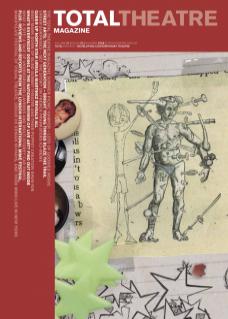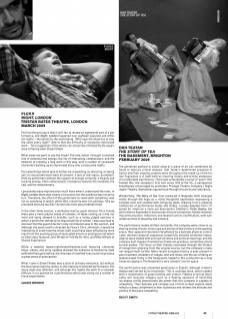The perceived political or social value of a piece of art can sometimes be found to obscure critical analysis. Dah Teatar’s determined presence in Serbia and their ongoing creative work throughout the break-up of the former Yugoslavia is in itself both an inspiring history and artistic endeavour of considerable significance. There was undoubtedly a sense of ‘event’ that framed this, the company’s first visit since 1998 to the UK, a perspective breathlessly encouraged by promoters Prodigal Theatre Company / Nightingale Theatre, themselves apprenticed through this particular laboratory.
Wonderfully, The Story of Tea (first produced in Belgrade 2006) emerged vitally through the hype as a richly thoughtful exploration expressing a complex tone and studded with intriguing ideas, drawing from a pleasing catholicism of performance styles and modes. Loosely adapted from (‘inspired by’ might be a more apt description) Chekhov’s Three Sisters, the performance expanded on discourses of social convention, female isolation, miscommunication, militarism, and idealism and its stultification, with lush undercurrents of sexuality and violence.
The performance modes shifted constantly: the company were close to us, sharing out tea in bone-china cups and stories of tea’s history in the opening scene, their apparent naturalism heightened by a delicate physical control. Later, abstract physical sequences powerfully denoted emotional states; objects were loaded with accrued narrative and political meanings; and the company built images of sometimes Chekovian grandeur, sometimes utterly surreal pathos. The focus on their themes resonated through the flickers of recognition ghosting from the original source, but the company’s material ranged much further. More recent European history is ever-present in post-traumatic shudders of images, text and mood, and the act of being an audience was firmly in the foreground, helped in this production by a long traverse staging in The Basement’s very ‘present’ live art space.
The performance was presented generously in English, although it wasn’t always well served by its translation. This is unshowy work, which speaks with a combination of great humility and control. Flashes of lyrical physicality and muscular imagery such as a fleeting explosion of handheld ice-skates vividly demonstrate the power that this company is capable of unleashing. Their delicate and complex use of form to best explore ideas reflects a deep compliment to their audiences and renders the attitude and politics of the piece compelling.

